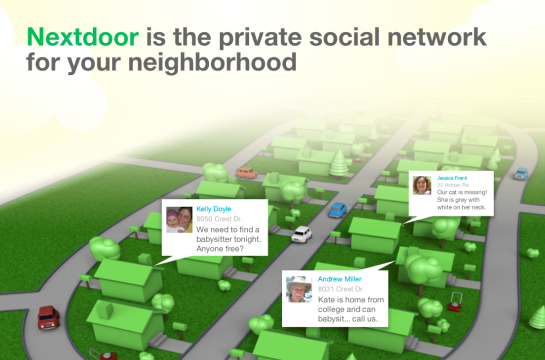Now, a social media website that helps you know your neighbours better
 New York, Feb 19 : A new social network is betting that you don't know your neighbours and is aiming to connect you to them, both offline and online.
New York, Feb 19 : A new social network is betting that you don't know your neighbours and is aiming to connect you to them, both offline and online.
The quickly growing website, Nextdoor, is based on the idea that "a neighborhood is one of the most important and useful communities in a person's life" and uses social media to advance that message as it looks to blur the lines between physical neighborhoods and virtual ones.
In the process, San Francisco-based Nextdoor may be redefining the overall concept of community.
Nextdoor users can swap information on everything from business referrals and garage sales to lost dogs and babysitters. The site has more than 8,000 US neighborhoods listed, the New York Daily News reported.
"There are so many ways our neighbors can help us. But these days, most people don't know their neighbors or how best to contact them. It's difficult to ask for help and advice without being a bother," the site says on its welcome page. "But Nextdoor changes all that."
The website serves as a meeting place for neighbors to get in touch with one another regarding everything from borrowing a ladder to sharing information about robberies and exchanging business recommendations.
Users must input their physical and email addresses, and after an approval, they can access an array of data, including maps, message boards and even a lost and found, all loaded up with information shared by like-minded members of their community.
Members are posting more than a half-million messages daily, according to tech blog Technorati, on everything from lost dogs to babysitter recommendations, business referrals and garage sales.
Nextdoor's basic setup appears to be a motor for its quick growth. After users are approved, they are encouraged to invite their neighbors, without whom the site has little purpose.
The company says 40 neighborhoods are added each day and is already considering an international expansion.
Unlike other quickly growing social networks, there is a large emphasis on privacy on Nextdoor.
Users must apply with their real names, and their residency must be verified by the site. Users can opt to receive a postcard in the mail and confirm their residency with a code on the card, or they can be verified by entering a credit card that is linked to their address.
Only Nextdoor members can see anything beyond the welcome page. And even members can see only content posted by people who live in their own and surrounding neighborhoods. (ANI)